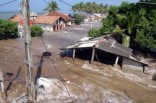 有的事情难以形容,难以置信,难以忘记。2004年12月26日的海啸就是这种大事。亚洲十一个国家的二十一万多人失踪死亡。根据联合国卫生组,数百万人受伤,两千万人失去家园。
有的事情难以形容,难以置信,难以忘记。2004年12月26日的海啸就是这种大事。亚洲十一个国家的二十一万多人失踪死亡。根据联合国卫生组,数百万人受伤,两千万人失去家园。
2011年,在日本,就如在其他时候在其他地方,天然灾难都不可磨灭的烧入我们的记忆。
身为基督徒的我,在面对这样悲剧时,我会阅读《圣经》,从中获得安慰和希望。请让我跟您分享《圣经》里的几句话,描述神为我们的避难所和我们慈爱的父亲。神愿意安慰那些亲近他的人。
古代一个王国的国王名叫大卫。大卫面临一些想要废黜他的共谋者。大卫倾吐衷情地向神祈祷说,“神阿,除了您以外,我没有任何依靠”。请听大卫自己的话:“我的心默默无声,专等候神。我的救恩是从他而来。惟独他是我的磐石,我的拯救。他是我的高台。我必不很动摇” (诗篇62:1-2)。面对灾难和压力时,神也是我们独一无二的依靠和拯救。
 大卫开始做王以后,他曾经言简意赅地描述了他的信仰;他说:“我惧怕的时候要倚靠你”(诗篇56:3)。
大卫开始做王以后,他曾经言简意赅地描述了他的信仰;他说:“我惧怕的时候要倚靠你”(诗篇56:3)。
其他古人面对生命上巨大的问题时,他们思念神和他的慈爱,从中获得了力量,使得他们能够继续生存。有一位作者说,“神阿,我的心切慕你,如鹿切慕溪水。我的心渴想神,就是永生神。我几时得朝见神呢。”作者也表示他的痛苦;他说,“我昼夜以眼泪当饮食”。之后,他宣称他的信仰说,“白昼耶和华必向我施慈爱。黑夜我要歌颂祷告赐我生命的神”。作者质问自己,“我的心哪,你为何忧闷,为何在我里面烦躁”。古代的诗人凭着信仰回答自己的问题:“应当仰望神… 因[为]… 我还要称赞他”(诗篇42:1, 2, 8, 11)。
在海啸或任何灾难之后的黑夜,我们都要向神祈祷,告诉他,我们的饮食就是眼泪,我们的未来非常不肯定。同时,我们要在神的面前低头,谦卑的祈求神帮助我们。如鹿切慕溪水一样,我们要仰望神。我们要宣布自己的信仰说,我还要称赞他,我的救主,我的神。
我盼望我们,跟其他很多基督徒一样,都要说,“神是我们的避难所,是我们的力量,是我们在患难中随时的帮助。所以…我们也不害怕”(诗篇46:1-2)。
我请您寻找真神,就是那位在《圣经》里所彰显出来的神。请阅读《圣经》,思考《圣经》诗篇的记载。请听听大卫王倾吐衷情地向神祈祷。请寻求认识那位既慈爱的神,亲自看见他如何的爱您。
Some events burn themselves into our consciousness; the tsunami of December 26, 2004, was one such event. At least 210,000 people in 11 countries were killed in the disaster. Thousands were injured, and more than two million people were displaced, according to the World Health Organization.
Again in 2011 (in Japan) and at other times as well in other places, earthquakes, tsunamis and other natural disasters burn themselves indelibly into our memories.
As a Christian, I turn to the Bible to find words of comfort and hope in the face of such tragedy. May I share with you several quotations from the Bible that point to God as our refuge and as a loving father who seeks to comfort those who will draw near to him.
David, the king of an ancient kingdom, faced conspirators who wanted to dethrone him. David poured out his heart to God and said, “I don’t have anyone but you, God!” David said, My soul finds rest in God alone; my salvation comes from him. He alone is my rock and my salvation; he is my fortress, I will never be shaken [Ps 62:1‑2]. In times of disaster and stress, we too can find rest and salvation in God alone.
Earlier in his career, this same David expressed his faith very simply; he said, When I am afraid, I will trust in you [Psalm 56:3 NIV].
When other ancients faced the overwhelming problems of life they meditated on God and his love and found in God the strength to carry on. One person wrote: As the deer pants for streams of water, so my soul pants for you, O God. When can I go and meet with God? We see his distress in the statement, My tears have been my food day and night… Then he affirms his faith: By day the Lord directs his love, at night his song is with me… The author asks himself, Why are you downcast, O my soul? Why so disturbed within me? And he answers his own question with a statement of faith: Put your hope in God, for I will yet praise him, my Savior and my God (Psalms 42:1, 2, 8, 11).
In the dark hours following a tsunami or other disaster, we too can pray to God and admit that our tears are our food and that our future seems so uncertain. But then we too bow our heads and humbly ask God to help us. Let us long for God just as the dear pants for the streams of water. And let us express our own statement of faith and say “I will yet praise him, my Savior and my God.”
Let us say, along with so many other Christian believers, God is our refuge and strength, an ever‑present help in trouble. Therefore we will not fear… (Psalm 46:1‑2).
I invite you today to seek the God who is revealed in the Bible. Obtain a copy of the Bible and read it. Meditate on the Psalms where King David and others pour out their hearts to God. Come face-to-face with the God who is love and who loves you.
【天灾】四:生还者的力量——神的话
Natural Disasters (4): Strength for Survivors: The Word of God
作者:谢德华 ©By Edward Short
World Christian Broadcasting
